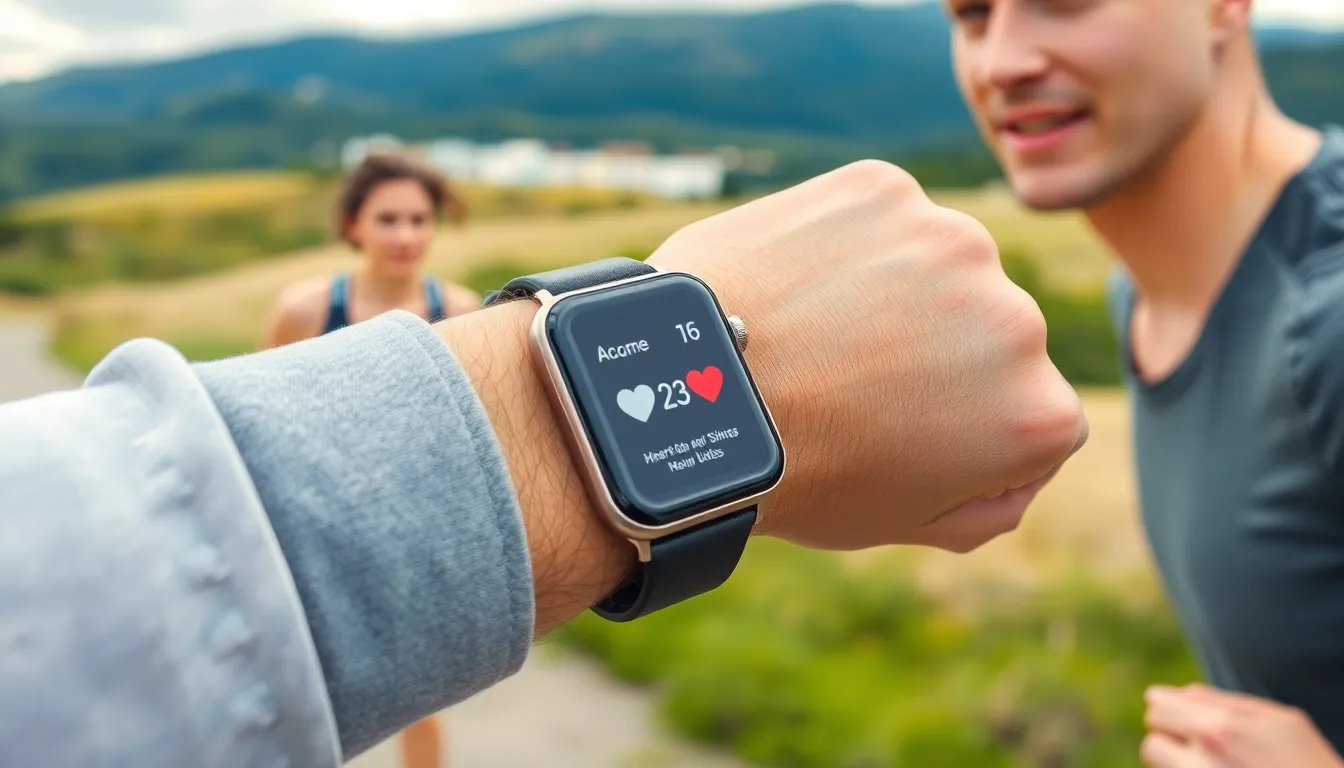Table of Contents
ToggleIn a world where time flies faster than a caffeinated squirrel, keeping track of your health shouldn’t feel like a chore. Enter the smart watch with a heart monitor—your stylish sidekick that not only tells time but also keeps an eye on your ticker. Imagine having a tiny health guru on your wrist, nudging you to take a breather or reminding you that those extra slices of pizza might not be the best idea.
Overview of Smart Watches with Heart Monitors
Smart watches with heart monitors provide a unique blend of functionality and health management. These devices track heart rate in real-time, offering insights into cardiovascular health. Many models utilize photoplethysmography sensors, measuring blood flow through the wrist. This technology enhances fitness tracking, enabling users to optimize workouts based on heart rate zones.
Designs vary, showcasing options that cater to different styles and preferences. Most smart watches feature customizable interfaces, allowing users to select watch faces that suit their personalities. Many also offer smartwatch capabilities, including notifications and call management, making them versatile companions.
Integration with mobile applications maximizes the benefits of health tracking. Users can visualize their heart rate data over time, identifying trends that may warrant attention. By connecting with fitness apps, smart watches promote goal setting, helping individuals stay motivated in their health journeys.
Battery life remains a key consideration when choosing smart watches. Many devices offer multi-day battery performance, allowing for continuous heart monitoring without frequent recharging. Waterproof features enhance durability, providing users the freedom to wear devices during various activities, including swimming.
Price points vary significantly, reflecting the range of features available. Budget-friendly options include basic heart monitoring, while premium models incorporate advanced features like ECG and blood oxygen monitoring. As technology advances, smart watches with heart monitors continue evolving, offering new functionalities to support health and wellness objectives.
Key Features to Consider

Selecting the right smart watch with a heart monitor involves examining several important features that enhance its functionality and usability.
Accuracy of Heart Rate Monitoring
Precision is crucial when monitoring heart rates. Many smart watches employ photoplethysmography sensors to deliver real-time data. Accurate heart rate monitoring helps users optimize their workouts, ensuring they remain in their desired heart rate zones. Some devices also offer features that alert users to irregular heart patterns, enhancing overall wellness. Investigating user reviews and product specifications can provide insight into the reliability of heart rate tracking in various models.
Battery Life and Charging Options
Battery life affects the overall user experience significantly. Most smart watches provide multi-day performance, but this varies widely among models. Longer battery life allows for extended use without frequent recharging, which is convenient for active individuals. Charging options also matter; many devices come with magnetic or dock chargers that streamline the process. A smart watch that offers rapid charging capabilities can be highly advantageous for those with busy schedules.
Compatibility with Other Devices
Integration is essential for maximizing a smart watch’s potential. Compatibility with mobile applications, smartphones, and fitness trackers allows users to track their health data seamlessly. Many watches support both Android and iOS platforms, enabling a broader audience to use them effectively. Furthermore, syncing with health management applications can enhance users’ ability to monitor trends and establish fitness goals. Users should prioritize devices that offer extensive connectivity options to get the most out of their investment.
Popular Smart Watches with Heart Monitors
Smart watches equipped with heart monitors come in various models, offering unique features tailored to different user needs. Here are three popular options:
Product A Review
The Apple Watch Series 8 ranks as an industry leader, featuring advanced heart rate monitoring and an ECG app. Users appreciate its integrated health metrics, including blood oxygen tracking and sleep analysis. Its seamless syncing with iOS devices ensures a smooth user experience. With a durable design, the watch also boasts impressive battery life lasting up to 18 hours. Customizable watch faces allow for personal expression, making it an aesthetically pleasing choice.
Product B Review
The Garmin Venu Sq offers a compelling alternative with its emphasis on fitness tracking. This watch features a wrist-based heart rate monitor that delivers accurate readings during workouts. Users commend its bright display and extensive battery life of up to six days. Built-in GPS allows for tracking outdoor activities without needing a phone. The wide range of fitness apps available through Garmin Connect enhances workout analysis, appealing to fitness enthusiasts.
Product C Review
Samsung Galaxy Watch 5 stands out with its sleek design and robust health monitoring capabilities. Equipped with a BioActive sensor, this watch tracks heart rate, body composition, and more. Users enjoy the round display paired with customizable watch faces to match any style. The device offers up to 40 hours of battery life, ensuring it lasts throughout the day. Rich integration with Samsung Health facilitates comprehensive wellness tracking, attracting users focused on health management.
Benefits of Using a Smart Watch with Heart Monitor
Smart watches with heart monitors offer numerous benefits that enhance health management and fitness. They serve as real-time health companions on the wrist, providing crucial insights into one’s cardiovascular health.
Health Monitoring and Fitness Tracking
Monitoring heart rate continuously enables users to optimize workout routines effectively. Real-time data helps individuals stay within their desired heart rate zones during exercises, ensuring maximum results. Many smart watches track various health metrics beyond heart rate, like sleep quality and activity levels. This comprehensive approach to health tracking supports users in setting achievable fitness goals based on accurate data.
Convenience and Accessibility
Wearing a smart watch increases convenience, allowing users to access health information effortlessly. Notifications for heart rate alerts and reminders to move help users stay engaged with their wellness journey. Many smart watch models integrate seamlessly with mobile applications, making health data easily viewable. Accessing personalized fitness programs through connected apps ensures that individuals can tailor workouts to their specific needs. Durability features like water resistance add to the overall accessibility, enabling use during various activities.
Limitations of Smart Watches with Heart Monitors
Smart watches with heart monitors offer various benefits, yet they come with limitations that users should understand.
Potential Accuracy Issues
Accuracy remains a crucial consideration with smart watches. While these devices use photoplethysmography sensors, they can sometimes yield inconsistent heart rate readings. Poor wrist placement or skin tone can affect sensor performance. Additionally, certain activities and movements may create noise that disrupts data collection. Users should prioritize devices with proven accuracy, particularly for fitness monitoring and health diagnostics.
Dependence on Battery Life
Battery life can limit the functionality of smart watches. Some models offer multi-day performance while others require daily charging. Notifications and health tracking features draw power, leading to quicker battery drain. Frequent charging can disrupt usability, especially during workouts or overnight monitoring. Users might find it essential to select smart watches that balance advanced features with robust battery life to avoid interruptions in tracking.
Smart watches with heart monitors are transforming how individuals approach health and fitness. By providing real-time heart rate data and integrating seamlessly with mobile applications, these devices empower users to take charge of their wellness journey. With various models available, from budget-friendly to premium options, there’s a smart watch to fit every lifestyle and need.
As technology continues to advance, the capabilities of these devices will only improve, offering even more insights into cardiovascular health. Users should consider factors like accuracy battery life and compatibility when choosing the right model. Embracing a smart watch with a heart monitor not only enhances fitness tracking but also promotes a healthier lifestyle overall.











